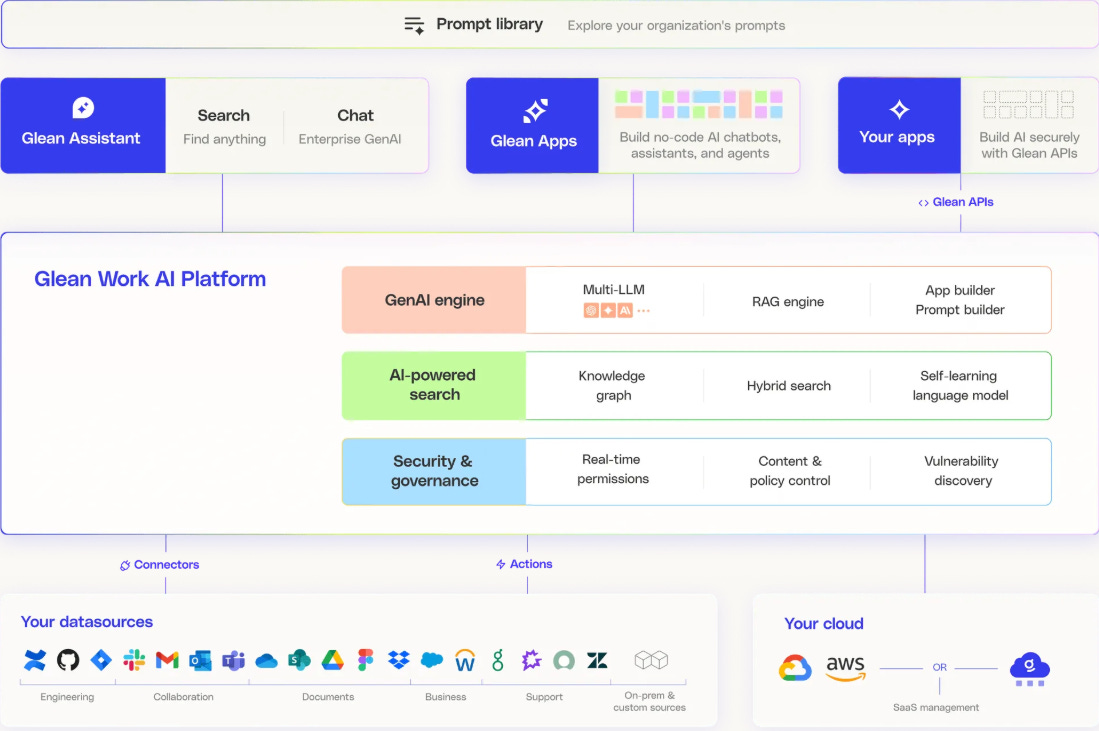Perplexity and OpenAI challenge Glean in Enterprise AI Search
Soci AI hitting $100M ARR
Today I will talk about the war on Enterprise AI Search, Firstly we look at these two AI startups, that hit a milestone in their ARR.
Soci AI hitting $100M ARR
SOCi is a comprehensive marketing platform designed specifically for multi-location businesses. It leverages artificial intelligence to enhance local marketing strategies, focusing on areas such as local search, social media management, and reputation management. The platform aims to streamline marketing efforts across various locations, ensuring that brands maintain a consistent presence while also catering to local nuances.
SOCi primarily serves multi-location enterprises, including brands in industries such as retail, hospitality, and property management. By focusing on the unique challenges faced by these businesses, SOCi provides tailored solutions that drive local engagement and maximize marketing effectiveness.
From 2020 to 2023, SOCi achieved a remarkable 334% revenue growth and expanded its workforce by 277%. Serving nearly 1,000 customers—including Ace Hardware, Self Esteem Brands, Liberty Tax, Mutual of Omaha Mortgage. It has reached a significant milestone: achieving $100M in annual recurring revenue (ARR).
Origami Agents at $50k MRR in first 50 days
Origami Agents is an innovative platform designed to help businesses identify potential customers actively searching for their solutions. Utilizing advanced AI technology, these agents function similarly to dedicated sales representatives, scouring the internet for relevant leads. They analyze various online sources, including websites, press releases, and product pages, to pinpoint the top 1% of potential customers for businesses.
The core functionality of Origami Agents revolves around gathering scattered web data. This process involves tracking online interactions 24/7, which allows the agents to provide valuable insights into market demand and customer behavior. By leveraging AI, Origami Agents can efficiently filter through vast amounts of information to deliver high-quality leads tailored to specific business needs.
It reached $50k MRR in the first 50 days!
The competitive landscape for enterprise AI search is heating up as Perplexity, OpenAI, and others set their sights on Glean, a fast-growing leader in the space. The race signals a shift in AI-driven search technology, with players aiming to reshape how businesses connect and utilize internal data.
Glean's market position
In the last essay, I said Glean is hitting $100M ARR, growing at 3x year-on-year. Glean has recently gained attention for its rapid growth and significant funding rounds. In September 2024, the company raised $260 million in a Series E funding round, doubling its valuation to $4.6 billion.
This significant financial backing not only underscores investor confidence in Glean's innovative approach to enterprise search but also positions the company as a formidable player in a competitive landscape.
The capital infusion enables Glean to enhance its technology and expand its integrations, thereby meeting the growing demand for efficient search solutions in enterprises. Such funding is crucial in a market where differentiation through advanced features and user experience is paramount.
One of Glean's standout features is its ability to integrate seamlessly with a multitude of software applications, creating a comprehensive search solution tailored for enterprises. This integration allows users to access a wide array of company data while adhering to strict data governance models.
Glean's platform employs advanced AI capabilities and indexing tools, which work in tandem with an enterprise knowledge graph to ensure that search results are not only relevant but also personalized to the user's context. This holistic approach to enterprise search significantly enhances productivity and collaboration within organizations.
The product capabilities of Glean's enterprise search platform are particularly noteworthy, as it leverages AI to deliver highly personalized and relevant search results. By utilizing advanced algorithms and machine learning techniques, Glean can sift through vast amounts of data to provide users with the most pertinent information tailored to their specific needs.
After aiming to achieve $100 million in annual recurring revenue (ARR) by the end of this year, Glean has ambitious growth projections, with a further target of $250 million ARR by the end of next year.
Perplexity’s Strategic Move: Acquiring Carbon
Perplexity, the $9 billion AI search engine, recently announced its acquisition of Carbon, a retrieval engine specializing in connecting external data sources to large language models (LLMs). This marks a pivotal step for Perplexity as it integrates Carbon’s data connectors to allow seamless linking of apps like Notion, Slack, and Google Docs to its platform.
From its acquisition statement, Perplexity emphasized the importance of personalization in AI:
We're excited to announce that we've acquired Carbon, a retrieval engine that connects external data sources to large language models. Soon, we'll integrate Carbon's data connectors into our tech stack, allowing users to connect apps like Notion and Google Docs directly to Perplexity. As part of the acquisition, we're excited to welcome all members of the Carbon team to Perplexity to expedite our roadmap and ship new features faster.
We believe your AI should be personal to you — at home, work, or on the go — and data connectivity is a key part of everyone's daily workflows. Carbon will make it easier for Perplexity's answer engine to be informed by diverse sources of information, whether that data resides in internal databases, cloud storage, or document repositories.
Rather than making users search through many different web pages, apps, and messages to find the answer they're looking for, we see a future where Perplexity does the research for you, bringing the most critical insights across sources together as part of the answer. Carbon will simplify the process for our users to connect the data sources that matter to them.
This move positions Perplexity directly in competition with Glean, whose AI-powered enterprise search connects disparate organizational data and integrates it into knowledge bases.
While their approaches differ, the goal is aligned: to unlock enterprise data’s potential for internal use through advanced retrieval-augmented generation (RAG) techniques.


